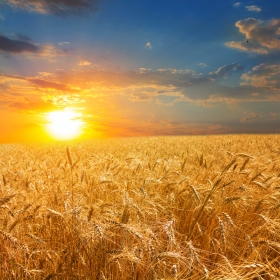Wheat production would be reduced by rising temperatures

Any producer will tell you, growing a healthy, high-yielding wheat crop takes skill and hard work. Quality drought-tolerant varieties that are resistant to pests and disease are important. And cooperation from Mother Nature in terms of temperature and precipitation doesn't hurt, either.
To quantify the impact of genetic improvement in wheat, disease and
climate change over a 26-year period, a team of researchers at Kansas
State University examined wheat variety yield data from Kansas
performance tests, along with location-specific weather and disease
data.
Their results showed that from 1985 through 2011, wheat breeding
programs boosted average wheat yields by 13 bushels per acre, or 0.51
bushel each year, for a total increase of 26 percent.
Simulations also found that a 1 degree Celsius increase (1.8 degrees
Fahrenheit) in projected mean temperature was found to decrease wheat
yields by 10.64 bushels per acre or nearly 21 percent.
"Kansas wheat producers are challenged by weather, pests and disease,"
said Andrew Barkley professor of agricultural economics and lead
researcher of a multi-disciplinary team that included agronomists and
plant pathologists. "Fortunately, the Kansas wheat breeding program
produces new varieties of wheat that increase yields over time.
"Given weather trends in recent years, climate change is expected to increase temperatures, and this is likely to lower wheat yields in Kansas," Barkley said.
Wheat field at sunset photo via Shutterstock.
Read more at ScienceDaily.
©2013. Copyright Environmental News Network To subscribe or visit go to: http://www.enn.com